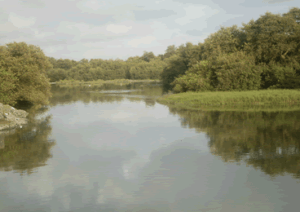West Africa coast loses $3.8b a year to erosion and others – World Bank

The World Bank estimates show that the West African coast, including lagoons, loses over $3.8 billion a year to erosion, flooding, and pollution, as well as loss of human lives and destruction of livelihoods.
Some stakeholders have therefore kick started a process to design a collective framework with focus on supporting Micro, Small and Medium-Sized Enterprises (MSMEs) for solutions to protect the over 90 lagoons in Ghana.
The lagoons, which are a major source of food for many, support fishing, farming and other income earning activities, and are used for domestic chores, including cooking, washing, and bathing are currently under threat.
This is due to activities like encroachment on wetlands close to the lagoons, felling of trees that support their existence, indiscriminate domestic and industrial waste disposable, and climate change.
The World Bank estimates that West Africa’s coast, which includes lagoons, loses over $3.8 billion a year to erosion, flooding, and pollution, noting that beyond the economic cost, coastal degradation also takes lives and destroys livelihoods.
To drive enterprising solutions from academia, policy makers and implementers, including government agencies, entrepreneurs and communities, a day’s workshop was held among stakeholders in Accra to design a framework to preserve the lagoons.
It was jointly organised by Innohub – a business accelerator and impact investment firm, University of Northampton, and the Resilient Lagoon Network – an organisation that works to address issues confronting lagoon communities.
The stakeholders proposed that concerted effort was made to provide infrastructure that would support businesses to thrive and the cost of doing business to be reduced, as the MSMEs provided solutions to problems faced by lagoon communities.
There should also be sustained education and awareness creation on the importance of lagoons to host communities and the involvement of community members in actions that would protect and preserve lagoons.
It was also recommended that training was held periodically for eco-entrepreneurs to expose them to modern trends of sustainable use and reuse of materials that found themselves in lagoons, including plastics, clothes, and e-waste.
The stakeholders also advocated solution-oriented competitions with financial rewards that would make youth environmental entrepreneurs motivated to provide products and services that would protect and preserve lagoons.
In an interview with the Ghana News Agency, Professor Sian Davies-Vollum, Deputy Dean, University of Northampton and Founder, Resilient Lagoon Network, noted that protecting lagoons was in line with five of the Sustainable Development Goals (SGDs).
They are; SGDs 11 – sustainable cities and communities, 13 – climate action, 14 – life below water, 15 – life on land, and 17 – partnerships for the achieving the SDGs.
“In the Muni lagoon in Winneba for instance climate change has impacted the community and livelihoods of fisher folks to the extent that income level has gone down by about 90 per cent in a 10-year period. If you scale that up, it gives you an appreciation of the situation of Ghanaian coasts,” Prof Davies-Vollum said.
She said the move was, therefore, to create sustainable solutions for lagoons in Ghana through multiple perspectives; research, policy, business, and local communities, and create social change
Mr Nelson Amo, Chief Executive Officer (CEO), Innohub, said that the partnership for the design of the framework was to ensure that all stakeholders worked together to secure the future of lagoons in Ghana.
He said that would be done by providing the needed technical and business development support to entrepreneurs in the environmental sector to offer products and services to communities, while preserving lagoons across Ghana.
“This project is to bring together all stakeholders to design solutions, which will, ultimately, empower entrepreneurs to be able to address the challenges we have in the locations of the lagoons and other coastal areas,” Mr Amo said.
Ms Esther Owusu Nkwantabisah, who operates in the ecobusiness sector, lauded the initiative to have a comprehensive framework to protect lagoons in Ghana and urged both state and non-stake actors to support the implementation of the framework when ready.
Source: GNA
